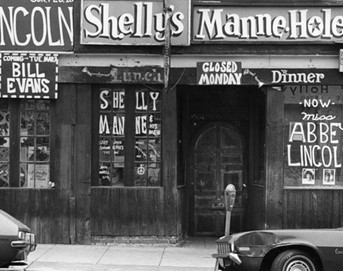
Cool Jazz 4
The young southern Californian jazz scene had already enjoyed success before Mulligan's relocation. However, his physical move west, his simultaneous label move to Pacific Jazz, and the formation of each of his new ensembles mark important developments that led the public and press alike to associate cool jazz with California. The tremendous commercial success of cool-oriented California musicians such as Chet Baker, Dave Brubeck, Chico Hamilton, Shelley Manne, Art Pepper, Shorty Rogers, Cal Tjader, and many others further reinforced this impression in the mid-to-late 1950s. Nearly all of these musicians signed contracts with the few Californian record companies (Capitol, Contemporary, Dial, Fantasy, and Pacific Jazz) that seemingly held a monopoly on the top artists of this stylistic idiom.
Accordingly, southern California's premiere nightclubs became the most renowned venues for this music. These establishments included the Lighthouse in Hermosa Beach, which many regarded as the epicenter of West Coast jazz, the Haig nightclub on Wilshire Boulevard in Los Angeles, and Shelly's Manne-Hole (owned by the drummer Shelly Manne) in Hollywood. Consequently, because Los Angeles ultimately became the primary center of cool jazz, the style likewise found its way into jazz-based film and television music to 1961 television crime series Peter Gunn, routinely employed the cool style as one essential sound in their jazz-based musical palette. Below is a 1958 excerpt from the T.V. series that features a cool jazz music scene.
In closing this section, with Mulligan's arrival in this Los Angeles circle, the northern Californian pianist Dave Brubeck had founded a quartet with the alto saxophonist Paul Desmond. By the mid-1950s, the Dave Brubeck Quartet was one of the most celebrated and commercially successful cool jazz acts. "Take Five" (written by Paul Desmond) is perhaps the group's most widely known piece.

Dave Brubeck - Take Five [ 00:00-00:00 ]
Heebie Jeebies
Say, I've got the Heebies
I mean the Jeebies
Talking about
The dance, the Heebie Jeebies
Do, because they're boys
Because it pleases me to be joy
Boogie Woogie Bugle Boy
He was a famous trumpet man from out Chicago way
He had a boogie style that no one else could play
He was the top man at his craft
But then his number came up and he was gone with the draft
He's in the army now, a blowin' reveille
He's the boogie woogie bugle boy of Company B






